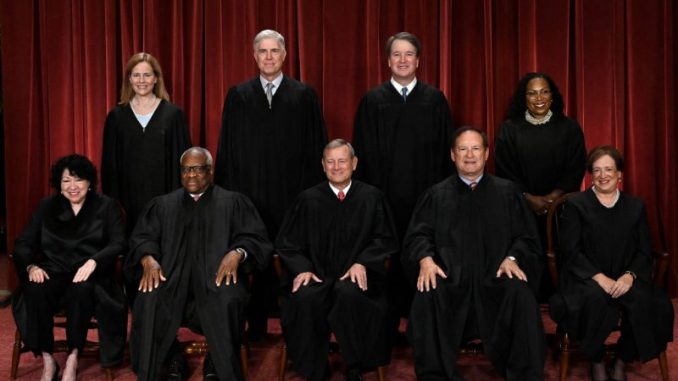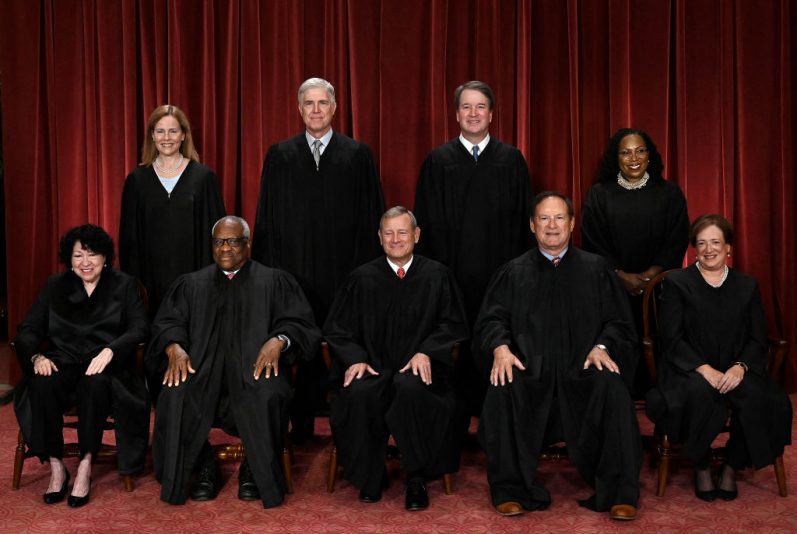

OAN’s Sophia Flores
11:52 AM –Thursday, February 8, 2024
The Supreme Court of the United States (SCOTUS) met on Thursday to discuss whether efforts to remove 45th President Donald J. Trump from the presidential ballot in Colorado are viable.
Advertisement
The case, Trump v. Anderson, centers around the idea that due to his alleged actions on January 6th, 2021, Trump is eligible to be removed from the ballot due to qualifying under the definition of Section 3 of the 14th Amendment.
The 14th Amendment, Section 3 of the Constitution states, “No person shall… hold any office… under the United States… who, having previously taken an oath, as a member of Congress, or as an officer of the United States… to support the Constitution of the United States, shall have engaged in insurrection or rebellion against the same, or given aid or comfort to the enemies thereof.”
Trump’s team argued that his alleged actions during that time as president do not qualify him under that definition.
During the two hours of remarks, the nine justices of the Supreme Court appeared skeptical of the idea to ban Trump from the ballot. Some of their questions suggested support for Trump in the ballot dispute.
Chief Justice John Roberts raised his concerns about the “severe” consequences that would come from banning the former president. Additionally, he wondered if booting him from the ballot in Colorado would lead to other states following in its footsteps and removing other candidates based off of political motivations.
“Counsel, what do you do with the, what seem to me to be the plain consequences of your position?” Roberts asked Jason Murray, the attorney for Colorado voters. “If Colorado’s position is upheld, surely there will be disqualification proceedings on the other side, and some of those will succeed … I would expect that a goodly number of states will say, whomever the Democratic candidate is, you’re off the ballot.”
Justice Brett Kavanaugh questioned Murray on what the word ‘insurrection’ means according to the Constitution.
“When you look at Section 3 the term insurrection jumps out,” Kavanaugh said. “And the questions are, what does that mean? How do you define it? Who decides? Who decides whether someone engaged in it?”
He also pointed to the fact that Trump has not been convicted of insurrection.
The toughest questions for the prosecution came from the left leaning justices.
Justice Ketanji Brown questioned why the word ‘president’ wasn’t listed in Section 3 of the 14th Amendment.
“Why didn’t they put the word president in the very enumerated list in Section 3?” Brown asked Murray. “The thing that really is troubling to me is I totally understand your argument, but they were listing people that were barred and president is not there. And so, I guess that just makes me worry that maybe they weren’t focusing on the president.”
Justice Elena Lagan questioned why a single state should have the authority to decide who is and isn’t allowed to run for president.
“Why should a single state have the ability to make this determination not only for their own citizens but also for the nation?” she asked.
Trump gave remarks once the arguments were finished. He stated that the oral arguments were a “beautiful process” and that he hopes “that democracy in the country will continue.”
“I just finished watching Supreme Court, you know, like to watch in many respects. It’s unfortunate that we have to go through the thing like that,” Trump told reporters at Mar-a-Lago. “I consider it to be more election interference by the Democrats that’s what they’re doing. Good news is we’re leading virtually every poll.”
The case being argued by Colorado is that Trump should be removed from the ballot due to his role on January 6th, 2021. During that day, protests occurred at the Capitol while Congress was certifying the Electoral College votes from the 2020 presidential election.
Prosecutors claim that Trump “incited an insurrection” by telling his supporters to march towards the Capitol.
Trump attorney Jonathan Mitchell denied that what occurred was an insurrection.
“We never accepted or conceded in our opening brief that this was an insurrection,” Mitchell said, “What we said in our opening brief was President Trump did not engage in any act that can plausibly be characterized as insurrection.”
“For an insurrection, there needs to be an organized, concerted effort to overthrow the government of the United States through violence,” he continued.
The Supreme Court is expected to rule on the case within a few days or weeks. No deadline has been set for the court to decide by.
Stay informed! Receive breaking news blasts directly to your inbox for free. Subscribe here. https://www.oann.com/alerts

